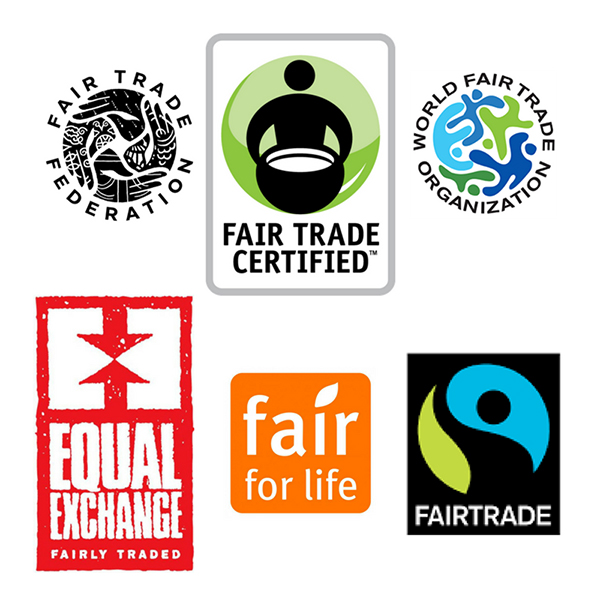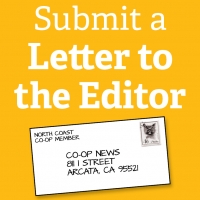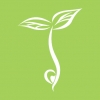
| Fall Quarterly 2019
Breaking Down the Fair-Trade Label
If you’re a coffee or chocolate lover, you may have noticed small green labels with the words “fair trade” on packages. Social responsibility has always been one of the North Coast Co-op’s guiding values. Fair-trade certified products offer more options to members who want to support the small-time farmers around the world that bring products to our shelves and ensure they are able to make a living producing items that we enjoy. In turn, consumers have a wider variety of products to choose from while knowing that their purchases are making a difference in others’ lives. But what exactly does fair trade entail, and what do the different fair-trade labels mean?
What Exactly is Fair Trade?
Fair trade is a movement toward trade practices that empower marginalized, small-scale producers of commodities from developing countries. It ensures higher standards for payment, work conditions and environmental management. The goal is to create opportunity for these farmers and artisans by providing access to the global market and assist in creating self-sufficient situations where the producers can support themselves and their communities.
Of course, fair pay for goods and safe working conditions are only one aspect of the benefits of fair trade. Many fair-trade organizations go beyond just making sure fair prices are being paid in exchange for goods. They also foster other programs that enable producers to grow their communities. While not all fair-trade organizations follow the same defined principles, most tend to promote direct long-term relationships, transparency and accountability, democratic organization through the support of cooperatives, profit sharing, education and capacity building, gender equity, and banning forced and child labor. Fair trade is meant to empower producers for an extended period of time.

What’s in a Label?
Given the growth of the fair-trade movement, we find more and more items on our shelves with a few different fair-trade labels on them. While it’s a great thing that more companies are embracing fair-trade standards, it can be confusing trying to decipher what all the different labels and terms mean. Often you will see items labeled as “fair trade,” while others are “fair-trade certified.” Do all labels mean the same thing? First, let’s take a look at who creates these labels.
Being that fair trade is a worldwide movement, there is no single authority that defines fair-trade standards. Instead of a single authority, there are a growing number of individual organizations that each set their own fair-trade standards. These organizations also offer certification on qualifying commodities. Many of these certifiers have joined together into larger organizations, which collectively adopt unifying fair-trade principles to follow and promote under a single label. In the U.S. alone, there are at least five widely recognized fair-trade labels. The two you may recognize in our store are Fairtrade International and Fair-Trade Certified.
So, what exactly is fair-trade certified? Generally, certification means that the item featuring the label was monitored through all production levels to meet the standards by the certifying body. From seed planting to store shelves, the item met all fair-trade requirements. The “all production levels” part of that statement is key, since items that are not monitored through every level of production cannot be certified. At times, you may see variations of labels that certify only one level of production, such as the factory level. You may also notice products that contain specific ingredients or materials that are certified as fair trade while other components of the product are not certified.
But all this certainly doesn’t mean that products without the certification label can’t still be fairly traded, it just means that there is currently no certification body that labels such products. In some cases, producers and the companies that are helping import the goods may forgo third-party certification. Instead, they use their own defined standards for fair trade that they discuss with their customers. Some businesses operated using fair-trade standards before the rise of modern fair-trade certification. Therefore, they may not want to go through the certification process or adhere to a different organization’s interpretation of fair trade.
Not Just Coffee and Chocolate
As the movement continues to pick up steam, the range of products grows. Mostly associated with food products like coffee, chocolate and tea, fair-trade products can range from jewelry and clothing to wellness products like shampoo and lotion. Many artisan goods like baskets and decorations can be fair trade. It can also include things like instruments, cards and notebooks. As mentioned above, not all of these products are eligible for existing certification labels. But many companies are open about their fair-trade practices, so getting to know who you are buying from and what standards they may have when it comes to sourcing is important if you want to support the fair-trade movement.
Certification labels are indeed a great and easy way to know that your money is reaching the producers of the items you buy. But they are not the exclusive option. Whether certified or not, learning how to identify fair-trade products or materials may make it easier to determine if the things you are purchasing are in line with your personal values.
Notice: Undefined offset: 1 in /var/www/vhosts/northcoast.coop/htdocs/co-op_news/posts.php on line 244
Notice: Undefined offset: 1 in /var/www/vhosts/northcoast.coop/htdocs/co-op_news/posts.php on line 244
Notice: Undefined offset: 1 in /var/www/vhosts/northcoast.coop/htdocs/co-op_news/posts.php on line 244


